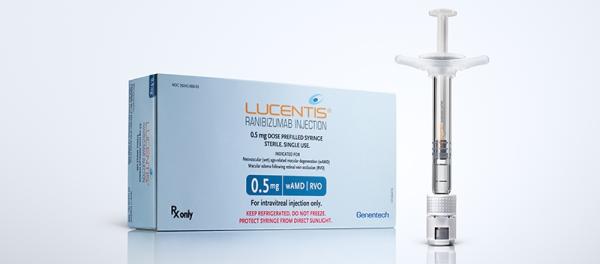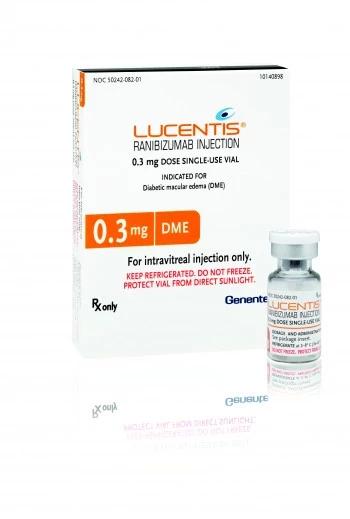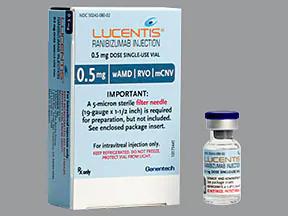
What is Lucentis?
Lucentis contains a fragment of a human antibody. It prevents new blood vessels from forming beneath the retina (the sensory membrane that lines the eye). New blood vessels form under the retina in people with certain eye disorders. They leak fluid and blood.Lucentis treats wet form of age-related macular degeneration.Lucentis can also be used to treat swelling of the retina due to diabetes or a blockage of the blood vessels.
Warnings
Lucentis should not be given to you if your eye is infected or you are allergic to ranibizumab.Tell your doctor before you start taking Lucentis if you suffer from glaucoma or have had a stroke or blood clots in the past.If you experience sudden vision problems, eye irritation or pain, bleeding or discharge from your eye, swelling in the area around your eye or seeing "floaters" or flashes in your vision, numbness, weakness, or severe headaches, or sudden speech or balance problems, call your doctor immediately.It is important to know the exact timing of your monthly Lucentis injections. If you forget to take your Lucentis injection, call your doctor and ask for instructions.
Before you take this drug
Lucentis should not be used if the patient is allergic to it or has an infection around or in their eyes.
Tell your doctor about any of the following to ensure that Lucentis will be safe for you:
- Glaucoma;
- A history of stroke or blood clots
Lucentis is not known to harm an unborn child. Inform your doctor immediately if you are pregnant or considering becoming pregnant.There is no way to know if ranibizumab can pass into breast milk or if the drug could harm a nursing infant. Inform your doctor if breastfeeding is a possibility.
How to take lucentis?
Lucentis injections are given into the eye. Before giving you the injection, your doctor will use medicine to numb it. This injection will be given in a doctor's office or another clinic setting.Your eyes will be periodically checked for a few days after the injection to ensure that there are no side effects.Lucentis is typically given every other month.If you suffer from macular degeneration, your doctor might change the injection schedule after your first 3 or 4 injections to every 3 months.Do not forget to follow your doctor's instructions. It is important to know when you should inject this medication each month.Regular eye examinations are required to ensure that lucentis does not cause any harmful effects and helps your condition. Don't miss any appointments with your doctor.
Details on dosage
Adult dose for macular degeneration:
Intravitreal injection of 0.5 mg once per month (approximately for 28 days).
Use: neovascular (wet) age-related macular degeneration (amd)
Adult dose for diabetic retinopathy:
Diabetic retinopathy and dme
0.3 mg intravitreal once a week (approximately 14 days).
Macular oedema following rvo
intravitreal injection of 0.5 mg once per month (approximately for 28 days).
Uses: diabetic macular ooedema (dme); diabetic retinopathy with dme; macular ooedema following retinal vein occlusion (rvo).
Adult dose for macular oedema:
Diabetic retinopathy and dme
0.3 mg intravitreal once a week (approximately 14 days).
Macular oedema after rvo
intravitreal injection of 0.5 mg once per month (approximately for 28 days).
Uses: diabetic macular ooedema (dme); diabetic retinopathy with dme; macular ooedema following retinal vein occlusion (rvo).Ranibizumab may interact with other drugs, such as prescription and over-the-counter medicines, herbal products, vitamins, and supplements. Inform your healthcare providers of all medications you are taking and those you plan to take.
What happens if i miss the dose?
If you are unable to keep your appointment for your lucentis shot, call your doctor.
What happens if i overdose?
Overdoses are unlikely because this medicine is administered by a health professional in a medical environment.
What should be avoided?
This medication can cause blurred vision. You should be careful when driving or doing anything else that requires clear vision.
Side effects of lucentis
If you experience any of the following symptoms of an allergic reaction: difficulty breathing, hives, swelling of the face, lips, throat, or tongue,
If you experience:
- Eye pain or swelling around the eye
- Blurred vision, tunnel vision and eye pain may cause halos around lights or cause blurriness of vision.
- Increased sensitivity to light
- Eye discharge or bleeding;
- Seeing flashes, or "floaters", in your vision
- A sudden feeling of numbness or weakness on one side (usually the affected side);
- Sudden, severe headaches; difficulty speaking or balancing
Lucentis may cause side effects such as:
- Eye pain or irritation
- Feeling something in your eye, yet no improvement?
- Itchy or watery eyelids
- Dry eyes and puffy eyelids
- Blurred vision
- Sinus pain, sore throat, or cough
- Nausea
There may be other side effects. For medical advice on side effects, call your doctor. The FDA can be contacted at 1-800-FDA-1088 to report side effects.
Interaction with other drug
Ranibizumab may interact with other drugs, such as prescription and over-the-counter medicines, herbal products, and vitamins. Inform your healthcare providers of all medications you are taking and those you plan to take.






